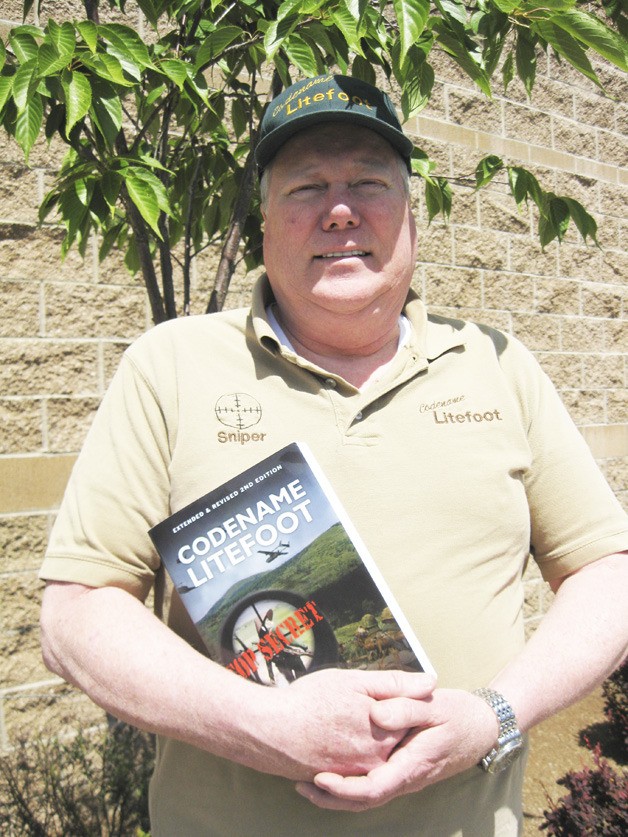War left him with a shrapnel-scarred back and too many tattered, psychological wounds to heal.
When Robert A. Boyd returned from the fierce jungles of Vietnam more than 40 years ago, he brought with him a personal, painful battle that still rages today inside.
“That person, that man I used to be, no longer exists,” said Boyd, a 64-year-old disabled Vietnam veteran, South Sound resident and author who fights today for the benefits and welfare of other vets, young and old. “I could never be that same person. You just cannot forget what you have learned.”
Boyd lost too many friends and close comrades to forget.
“To be in combat is to live in constant fear of dying,” he explained. “It’s not the best time of your life, but it certainly is the time you will always remember.”
Those experiences simply won’t leave the former special operations sniper who conducted 81 top secret missions in the war theater. Officially, Boyd was never in Vietnam. He was stationed in the Philippines, under the guise of an airman mechanic who never turned a wrench. But unofficially, Boyd, the CIA-trained and guided marksman, had 173 unconfirmed kills – primarily enemy scout snipers, advisors, even political targets.
He wallowed through thick, bug-infested jungles, marshes, valleys and open plains to take out targets – usually from 150-600 meters away – with a powerful, scope-assisted .308 rifle. He weathered heavy fog, oppressive humidity, torrential rain.
“We never made any headway in that country, and I never ran out of targets.” Boyd said of what he claims was an ‘un-winnable war.’
Boyd grew up and lived in the Tacoma area. His father, a commander at Fort Lewis, taught him how to shoot when he was young. By 16, he was a distinguished sharpshooter and instructor himself.
He joined the Air Force to avoid combat in an unpopular war that divided America on many fronts. Eventually, Boyd’s skills took him on a path to special duty.
Boyd spent 1967 and 1968 in Vietnam. He survived the enemy’s surprise and bloody Tet Offensive before returning home with an honorable discharge.
To face the fears and anxieties of his distant past, Boyd frequently talks to local veterans and seniors, describing his wartime experiences as a young man exceptionally skilled with a long-distance rifle. He has been a special guest at Auburn VFW Post 1741.
Book details experiences
Boyd also wrote a critically-acclaimed book, “Codename Litefoot,” a title taken from his actual code name during his two tours of duty in Vietnam.
The book, filled with first-person details, evokes strong emotions with its horrific accounts of war.
“A lot of different things happened in Vietnam that no one really knows about,” Boyd said. “Every day was a story there, and every night a nightmare.”
Boyd originally wrote the book as “therapy,” but it since has gained a strong online following among fellow veterans. It has helped veterans confront their troubles, Boyd said.
“It’s not just my story. It tells the story of the good and the bad. It tells about the ugly and the beautiful,” he said. “If I had to do it all over again, I probably would, only because I wouldn’t want to miss what I found. I certainly can do without the bad things, but the good things were so profound. … I ran into honorable men. I worked with honest, honorable and steadfast personalities, associated with heroes, literally, those no one ever knew about.”
Today, Boyd struggles with his walk and sometimes, grapples with his emotions. He continues to be treated for post-traumatic stress disorder and has endured surgeries related to the effects of Agent Orange.
When he returned from Vietnam a confused, troubled, enraged young man, his family shunned him. He spent years trying to rebuild his life. For years, he battled valium addiction.
He struggled to hold down a series of jobs. Today he manages his own website to help veterans. He is on his fourth marriage.
Doing what he can for others
Boyd is not a drifter, he’s a proud, honorable veteran looking to help others facing a similar plight. Whenever he can, Boyd reaches out. He often leaves clothes and other supplies for homeless vets.
“I go out and I literally find them living under bridges,” Boyd said. “Sometimes I’m afraid to approach them. They’re obviously unpredictable.”
Yet Boyd continues to answer their call.
“I’ve done everything I can for years now to try to get them help,” he said. “There are a lot of very brave soldiers out there who are not getting the benefits they were promised when they entered the military.”
Boyd is dismayed at the country for allowing vets to live in such conditions. He hopes to help change that.
“If there’s any purpose in my life, it is to help those people who gave up literally everything for the right to live on the street, in the sewer or in a trash can,” he said.
“I had the opportunity to know the best that humanity could offer. And I just hope that I’m able to give some of that back. I keep trying today to live up to that.”
====
For more information or to purchase a copy of “Codename Litefoot” visit www.codenamelitefoot.com.



